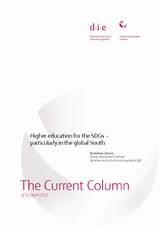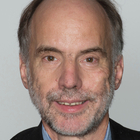Higher education for the SDGs – particularly in the global South
Stamm, AndreasThe Current Column (2017)
Bonn: German Development Institute / Deutsches Institut für Entwicklungspolitik (DIE) (The Current Column of 10 April 2017)
We need knowledge-based strategies for the Sustainable Development Goals (SDGs), otherwise their implementation will fail. Development cooperation actors have long considered themselves expertise brokers, often in a technical cooperation context. To bring about the necessary global transformation envisioned in the SDGs, we must take a radically different approach. North-South knowledge transfer needs to be replaced by joint, practice-based learning among researchers from many different nations. Actors from the global South must be involved at an early stage in order to identify problems and solutions to help overcome them. These were the issues discussed at the “Role of Higher Education, Science and New Alliances in the Context of the 2030 Agenda” conference in Berlin on 20 and 21 March. The event was organised by the German Federal Ministry of Economic Cooperation and Development (BMZ), the German Academic Exchange Service (DAAD), the Deutsche Gesellschaft für Internationale Zusammenarbeit (GIZ) GmbH, the Kreditanstalt für Wiederaufbau (KfW) and the Alexander von Humboldt Foundation. Together with partners from the global South, they analysed the role of higher education and research in achieving the SDGs and ways that international cooperation actors could gear their activities accordingly. Tertiary education and the SDGs Broad-based, high-quality university education can also provide the foundation for transitioning to a sustainable society in the global South. Such provision must not be limited to the impartation of textbook knowledge and facts, but rather empower people to anticipate, analyse and find solutions to complex and pressing challenges. It is as much about encouraging curiosity about joint learning with international partners as it is about promoting a willingness to challenge and even revise the knowledge we receive. These adjustments are needed in the North and the South alike. Higher education faces major challenges in the global South Almost all population growth over the coming decades will take place in the global South. With an increasing number of young people passing their university entrance qualifications, we will see a significant rise in demand for university places. This represents the continuation of a trend that has been observed for years now, especially in middle-income countries (MICs). The number of students in MICs grew from 60 to 122 million between 2000 and 2014. Universities and their staff are already systematically overworked in many nations in the global South. If a small number of professors are required to teach an ever expanding student body, then this will adversely impact the quality of their teaching and leave no time for their own research. Humboldt's educational ideal of unity between research and teaching is fading into the distance. Germany must make adjustments to its international cooperation work The division between international research and education cooperation on the one hand and development cooperation on the other hinders synergies and, as such, is no longer viable in today’s world. Initiatives such as the Novas Parcerias (NoPa) programme show that there is another way. In the context of the development policy priority areas agreed with Brazil, namely tropical forest protection and biodiversity conservation, the Brazilian Government agency Coordination for the Improvement of Higher Education Personnel (CAPES), GIZ and DAAD have been working together since 2010 to initiate and support cutting-edge research partnerships between Brazilian and German universities. This promising approach needs to be scaled up. In addition to collaboration between implementing organisations, it would also be beneficial for the coordinating ministries, the German Federal Ministry of Education and Research (BMBF) and the German Federal Ministry for Economic Cooperation and Development (BMZ) to work together, particularly in cooperation with emerging economies. Less developed countries require extensive support to develop their universities in order to avoid leaving their education-hungry young people frustrated. Substantial resources will be required here given the enormous challenges involved. An internationally coordinated approach is vital, though higher education institutions should not be funded in isolation. University graduates must be given opportunities to find attractive and promising jobs, otherwise the pressure will increase for them to emigrate to countries in the global North, where demand for qualified experts is growing. Private sector development and start-up support are worthwhile and complementary areas of action. Making creative and innovative use of new technologies Digitisation offers new opportunities for delivering high-quality tertiary education content to large numbers of people. Research4Life is a platform that provides learners from developing countries with access to free digital libraries. Massive Open Online Courses (MOOCs) offer an exciting way of developing up-to-date education content with virtually no geographical restrictions and imparting it free of charge to many learners. Why don’t German and Brazilian universities work together to develop courses and deliver them to keen Brazilian learners and Angolan and Mozambican students alike? Language would be no obstacle. The technical tools are available; what we need now are creative and innovative ideas for using them.


